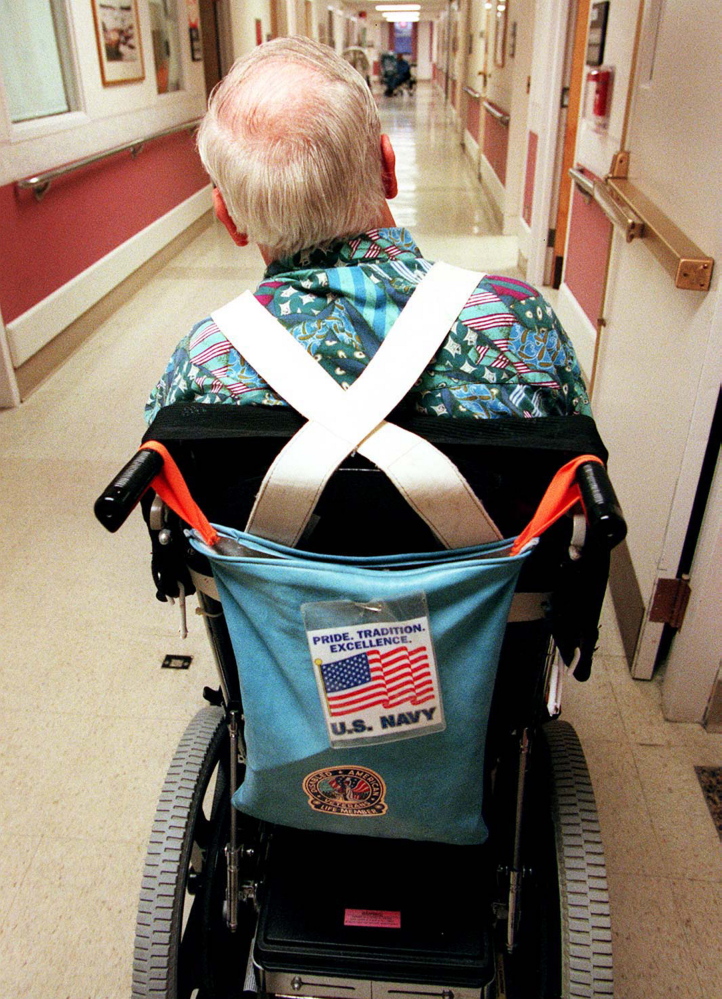PORTLAND — Your May 2 editorial (“Our View: Maine should do better by home care providers”) appropriately highlighted the need for adequate funding for home care services for the elderly. Home care funding increases are long overdue, and home care services are critical to Maine’s strategy for serving the needs of our aging population.
While legislation in support of home care services was lacking, there were certainly enough bills proposed across the long-term care continuum that should have made it hard for legislators to ignore their central message – access to appropriate levels of care comes only from sustainable funding, and sustainable funding is not being provided across the entire continuum.
While it has been gratifying to see the media attention given to the challenges of Maine’s aging population, there are a couple of misconceptions reflected in your editorial as well as repeated throughout “The Challenge of Our Age,” your series on aging, that bear mentioning in hopes that you can modify your narrative a bit.
Those misconceptions are:
n Home care is an alternative to nursing facility care in the state of Maine.
n Home care is a cheaper alternative to nursing facility care in Maine.
For most of Maine’s nursing facilities, the average nursing home resident is not a home care candidate any more than a home care candidate is likely to be admitted to a Maine nursing facility.
Maine changed requirements
While many states still have a very low threshold for nursing home admission (like Vermont or Massachusetts) and thus, have lots of room to reduce nursing home beds in favor of home care settings, Maine changed its medical eligibility requirements more than 20 years ago, reducing its complement of nursing home beds by 3,000 to 4,000 beds.
Unfortunately, because so many states have not done what Maine has done, billions of matching federal dollars are spent unnecessarily in those states on nursing home care when they could be better spent on services that delay nursing facility care.
Just as you can’t be admitted to a hospital unless you need to be in a hospital, it is very difficult to gain admission to a nursing facility in Maine unless you need to be in one. And in most cases, the health care practitioner guiding that admission felt their patient could not be well served at home – and not for lack of home care services.
Maine’s Money Follows the Person Demonstration Project, known as Homeward Bound, offers a comprehensive investigation into how we might transition nursing home residents with a length of stay of 90 or more days back into their homes. The conclusion of this project should support greater home care services funding.
Even so, the project has identified that less than 3 percent of the eligible participants in the demonstration project expressed both a preference to return to the community as well as identified a support person positive toward their discharge to home.
And of those 3 percent, only half were age 75 or older. The challenge of the transitioning to home is also apt to be more difficult in rural Maine rather than urban areas where some providers already discharge more than 85 percent of their residents back into the community.
Needs dictate decisions
Home and community-based services clearly should be a part of Maine’s long-term care strategy for obvious reasons: Everyone would rather stay in their home for as long as possible, and delaying or avoiding nursing home care by providing access to home care services should save money.
But some people really need to be in a nursing facility. You might delay or avoid a costly stay in a hospital if you took better care of yourself, but that does not take the place of a costly hospital stay when you need one. To suggest that a nursing home resident in Maine can be cared for at home as a cheaper alternative to nursing home care is a bit misleading.
Our residents are not here because they want to be – they are here because they have to be. I would invite your writers and editorial board to meet with our nursing facility administrators, directors of nursing and medical directors to truly understand the care decision that placed someone in a nursing facility.
Perhaps then you would understand that the decision to place a resident in a facility in Maine is hardly taken lightly, and it is certainly not arrived at without stringent regulatory oversight or serious medical advice.
— Special to the Telegram
Copy the Story LinkSend questions/comments to the editors.



Success. Please wait for the page to reload. If the page does not reload within 5 seconds, please refresh the page.
Enter your email and password to access comments.
Hi, to comment on stories you must . This profile is in addition to your subscription and website login.
Already have a commenting profile? .
Invalid username/password.
Please check your email to confirm and complete your registration.
Only subscribers are eligible to post comments. Please subscribe or login first for digital access. Here’s why.
Use the form below to reset your password. When you've submitted your account email, we will send an email with a reset code.